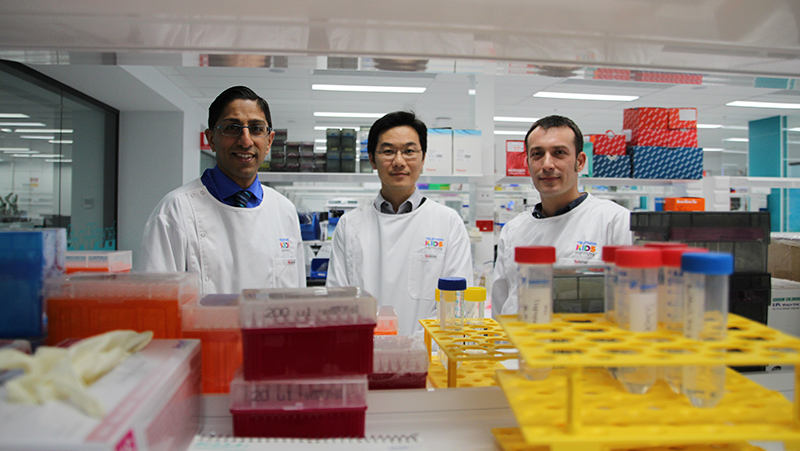Search
Research
CCI-007, a novel small molecule with cytotoxic activity against infant leukemia with MLL rearrangementsIdentified CCI-007 as a novel small molecule that displays rapid toxicity towards a subset of MLL-r, CALM-AF10 and SET-NUP214 leukemia cell lines
Research
COVID-19 vaccination in children and adolescents aged 5 years and older undergoing treatment for cancer and non-malignant haematological conditions: Australian and New Zealand Children’s Haematology/Oncology Group consensus statementThe Australian Technical Advisory Group on Immunisation and New Zealand Ministry of Health recommend all children aged ≥ 5 years receive either of the two mRNA COVID-19 vaccines: Comirnaty (Pfizer), available in both Australia and New Zealand, or Spikevax (Moderna), available in Australia only. Both vaccines are efficacious and safe in the general population, including children. Children and adolescents undergoing treatment for cancer and immunosuppressive therapy for non-malignant haematological conditions are particularly vulnerable, with an increased risk of severe or fatal COVID-19.
Research
Invasive fungal disease in children with solid tumors: An Australian multicenter 10-year reviewInvasive fungal disease (IFD) occurs less frequently during treatment for solid compared to hematological malignancies in children, and risk groups are poorly defined. Retrospective national multicenter cohort data (2004-2013) were analyzed to document prevalence, clinical characteristics, and microbiology of IFD.

News & Events
Lightening the leukaemia load for kids with Down syndromeKids born with Down syndrome are at high risk of an array of health problems. One of the lesser-known complications is their increased risk of childhood leukaemia.
Research
Pharmacogenomics in pediatric oncology: Australian adolescent or young adult and caregiver perspectivesPreemptive pharmacogenomic (PGx) testing in pediatric oncology patients could reduce toxicity and improve efficacy of medications yet remains underutilized. Consumer identified implementation barriers have not been extensively explored nor included adolescent or young adult (AYA) patient perspectives. This study describes Australian pediatric oncology consumer perspectives on PGx testing, elucidating barriers to implementation.
Research
Biologic and Clinical Analysis of Childhood Gamma Delta T-ALL Identifies LMO2/STAG2 Rearrangements as Extremely High RiskAcute lymphoblastic leukemia expressing the gamma delta T-cell receptor (γδ T-ALL) is a poorly understood disease. We studied 200 children with γδ T-ALL from 13 clinical study groups to understand the clinical and genetic features of this disease. We found age and genetic drivers were significantly associated with outcome.
Research
Minimising Adverse Drug Reactions and Verifying Economic Legitimacy-Pharmacogenomics Implementation in Children (MARVEL- PIC): protocol for a national randomised controlled trialDNA-informed prescribing (termed pharmacogenomics, PGx) is the epitome of personalised medicine. Despite international guidelines existing, its implementation in paediatric oncology remains sparse.
Research
Efficacy of DYRK1A inhibitors in novel models of Down syndrome acute lymphoblastic leukemiaDespite significant advances, outcomes for children with Down syndrome (DS, trisomy 21) who develop acute lymphoblastic leukemia remain poor. Reports of large DS-ALL cohorts have shown that children with DS have inferior event-free survival and overall survival compared to children without DS.
Research
Delivery of PEGylated liposomal doxorubicin by bispecific antibodies improves treatment in models of high-risk childhood leukemiaHigh-risk childhood leukemia has a poor prognosis because of treatment failure and toxic side effects of therapy. Drug encapsulation into liposomal nanocarriers has shown clinical success at improving biodistribution and tolerability of chemotherapy. However, enhancements in drug efficacy have been limited because of a lack of selectivity of the liposomal formulations for the cancer cells.
Research
Immunogenicity and clinical effectiveness of the trivalent inactivated influenza vaccine in immunocompromised children undergoing treatment for cancerThe trivalent inactivated influenza vaccine is safe, immunogenic, provides clinical protection and should be administered annually to immunosuppressed children receiving treatment for cancer
